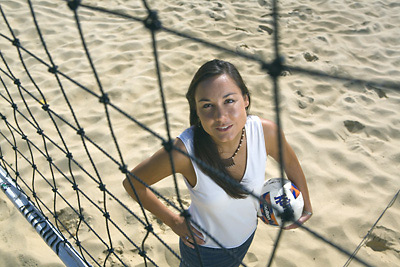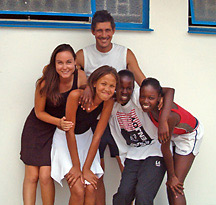Debra Smith's road to med school led through an African school, a volleyball championship and a missionary hospital
By Linda Myers

"College is a selfish time," says Debra Smith, B.S. '03, who as an undergraduate in Cornell's College of Human Ecology was "turned off" by self-absorbed classmates and "how people take for granted how much they have."
So instead of heading to medical school immediately after graduation she signed up with African Inland Mission, a nondenominational Christian organization that does outreach in Africa's poorest regions.
Smith was assigned to teach math and science to nearly 200 sixth-, eighth- and 11th-graders at Noordgrens, a government-supported school in Rundu, a rural village in Namibia, Southwest Africa, that relies on subsistence farming.
"At first I thought I must be the worst teacher in the world because my students weren't understanding me or doing their homework," said Smith. She soon she learned that they were struggling with English and had no background in basic mathematics. Many also had lost one or both parents to HIV/AIDS.

Compounding these challenges, textbooks were few, most of them out of date, and the school had only one computer. In addition, national exams were so rife with errors that she refused to administer them.
She began to alter her expectations. "I just thought, these kids need role models in terms of hard work and dedication. They could use someone to care about them."
She learned to improvise in the classroom, reaching back to lessons she had learned in high school biology to develop her own teaching materials.
With all her energies focused on improving academics, Smith hesitated when Henk Bronner, a teaching colleague who knew she had played volleyball and lacrosse in high school and rugby at Cornell, suggested she co-coach a volleyball team for girls 17 and under. When young people from all over the region showed up to try out, she agreed to take charge.
"They were good athletes, they really wanted to be on the team, and they learned quickly," she said. Her regimen, three hours of practice, including drills, every other day -- unheard of in the region, where athletes rarely prepare in advance -- paid off. They went on to win the Namibian National Championship, much to everyone's amazement, and back at school players triumphantly sported gold medals to prove it.
Smith's medals were less visible: One was a nickname her students and colleagues gave her, "Namutenya," meaning, in local Rukwangali, "one who is born in the morning, or sunshine," a tribute to her optimism and persistence; and a valentine from one student: "I like your teaching. From your learner, Bertha."
During school vacation, Smith, who had majored in human biology and health and society at Cornell, was able to realize her dream of working in a private missionary hospital in neighboring Angola, assisting a local doctor named Stephen Foster.
"He was the only competent surgeon in an area of close to 1 million people, and he made a huge difference," despite limited resources, she said. Smith helped Foster stitch up a patient following a colectomy to halt deadly hemorrhaging through the colon. And she witnessed him save the life of a baby with hydrocephaly by surgically installing a shunt to drain fluid from the infant's enlarged head.
The experience, including seeing an actual human heart beating during one operation, "really affirmed my desire to study medicine," Smith said.
She is a first-year student at Yale University School of Medicine -- and is probably the only student in her class who knows how to say "good morning, how are you?" in Rukwangali.
Media Contact
Get Cornell news delivered right to your inbox.
Subscribe